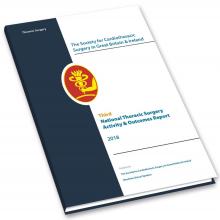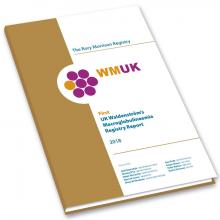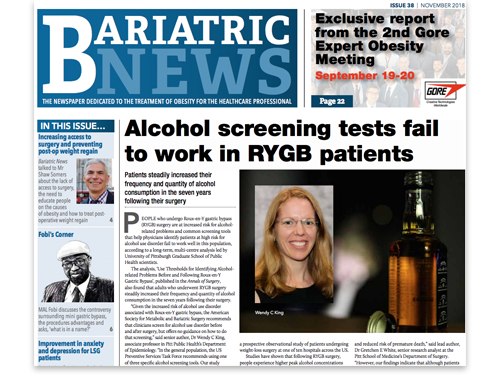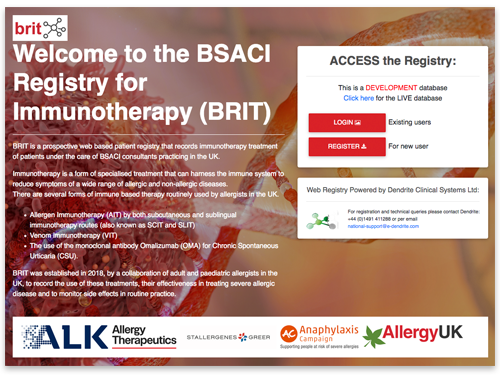Leading UK clinic to launch Dendrite's comprehensive obesity workflow system
The multi-disciplinary team (MDT) at Luton and Dunstable Hospital's Obesity Clinic, working in conjunction with Dendrite Clinical Systems, have developed a single database that tracks at every stage the patient’s entire treatment pathway. The new system records and collects data from the initial patient referral and pre-clinical assessments to each element of their MDT experience, obesity treatment/s, as well as follow-up appointments. We spoke with Dr Anjali Zalin, a Consultant Physician at the hospital who has helped to develop the database, and she outlined how the new database could transform the delivery of care by healthcare professionals and the experience of patients seeking treatment/s for their obesity.
Prior to using the Dendrite system, the team at Luton and Dunstable Hospital's Obesity Clinic used a variety of databases and systems to record and report patient and procedural data however, these methods were rigid, did not provide the quality of data with the granularity that was required and presented a challenge when uploading the centre’s data to the UK’s National Bariatric Surgery Registry (NBSR). They also had separate systems for pathology, discharge letters, medications, follow-up appointments etc. So, there was an urgent requirement to integrate these different systems into a single database.

“Due to the different services and treatments we offer at our Obesity Clinic, we really needed a comprehensive system that would be able to capture and record all our patient data at every stage of their journey,” explained Dr Zalin. “Working with Dendrite, and in parallel to our pathway re-design, we have developed a highly personalised pathway that is unique to each patient’s individual preferences, background, comorbidities and treatments. This obesity workflow system has allowed us to capture the patient’s data at each appointment or referral with each member of our MDT.”
She explained that the process of designing and building the database involved the cooperation of the entire MDT, as well as the IT department at the hospital to ensure smooth integration. The system is currently at the demonstration stage and the team at Luton are hoping the system will go ‘live’ in the coming weeks.
“Our database mirrors each and every stage and assessment within our tier 3 programme - from the point of referral to our clinic and initial assessments to every stage of their journey from follow-up and treatments to add-on assessments via each member of the multi-disciplinary team (MDT) and so on. So at every stage, whether that is their blood work or imaging results, their data is collected and recorded with in one single comprehensive database. Crucially, this database is linked to our local hospital system so our MDT has access to, and are aware of, their patient’s past and current status as well as future appointments and assessments.”
As soon as a patient is accepted onto the clinic’s obesity pathway programme and before they have attended the clinic, they are sent (via their smart phone) a series of health-related electronic questionnaires and their responses are uploaded to the database and populated into their individual patient record within the database. The benefits are twofold: firstly, the patient is engaged early in their journey, this not only enables the patient to become involved early in the process, but secondly, also saves the clinicians’ valuable time without having to spend time entering rudimentary data. In essence, the MDT at Luton as two databases rolled into one – a database for tier 3 (non-surgical) and tier 4 (surgical) pathways, but the intuitive design on the database negates the need to repeat time-consuming and repetitive data entry.
“So far, I have been particularly impressed with the functionality of system, the self-populating fields and patient reporting features are working really well. The clarity around the interface means the systems in very intuitive and easy for the end user. In addition, our Tier IV NBSR data will be able to be seamlessly and electronically uploaded to NBSR.”
The database will be one of the first in the UK to collect data and will report outcomes on the weight loss drug Wegovy (semaglutide), approved for use by UK’s NICE regulatory body, in February 2023. This section of the database incorporates the inclusion criteria, screening, group delivery and outcomes, both in terms of weight loss and side-effects.
“Due to the patient numbers coming through tiers 3 and 4, and the need for them to have peer-support, we came to the conclusion that group delivery was an effective way to treat patients who are embarking on Wegovy treatment. Within the database, we have built options for group sessions, this does not record specific data on the sessions, but rather who attended the sessions. This could prove valuable when it comes to examining the timing of their referral, individual outcomes and whether attending these sessions impacted their outcomes. Crucially, the system allows a clinician to see how long a patient has been in tier 3 and, if necessary, the clinician can then activate the next stage of their treatment.”
Dr Zalin stressed that obesity is a multi-factorial disease and to treat such a chronic disease necessitates an MDT approach. Therefore, the way in which data is collected is a key part of care delivery. By engaging the MDT in the early developmental stages of the new database and designing and creating the data fields they require to do their job, means each member of the team is whole-heartedly involved and empowered in the project.
“In our tier 3 programme alone in the last 12 months we have approximately 1,400 referrals. Therefore, effectively managing the data using a single database, I think, will transform the way we deliver patient care and, I hope, improve the experience for our patients.”
*With thanks to Dendrite team, especially Jonathon Blount and Luton colleagues - Mr Douglas Whitelaw, Tom Smith, David Cox, Bindhu Jophy and Mr Chanpreet Arhi.
About Dendrite
Dendrite Clinical Systems is a UK-headquartered international company with over a 30-year track record as a specialist provider of secure clinical registries, analysis software and consultancy services for the international healthcare sector, specifically for clinical research, multi-centre real-world studies, observational registries, international, national and hospital clinical databases.
Dendrite has been recognised as a leading provider of clinical registries across various specialties with a unique track record of implementing over 200 major clinical registry systems globally including systems for major research projects for medical device companies, CROs and pharmaceutical companies.
 Dendrite Clinical Systems and the Society for Cardiothoracic surgery (SCTS) have published a new report that demonstrates importance collecting and analysing data from thoracic surgery. The report states that a large increase in thoracoscopic (VATS) resections is responsible for most of the recent increase in lung cancer surgery, rising from 749 cases in 2010-2011 to 2,753 in 2014-2015, an increase of more than 3.5 times.
Dendrite Clinical Systems and the Society for Cardiothoracic surgery (SCTS) have published a new report that demonstrates importance collecting and analysing data from thoracic surgery. The report states that a large increase in thoracoscopic (VATS) resections is responsible for most of the recent increase in lung cancer surgery, rising from 749 cases in 2010-2011 to 2,753 in 2014-2015, an increase of more than 3.5 times. Dendrite Clinical Systems is to install its Intellect System to track outcomes of cardiothoracic surgery at St George’s Hospital, Tooting, London, UK. The company’s data capture software currently supports approximately 85% of cardiac units in the UK.
Dendrite Clinical Systems is to install its Intellect System to track outcomes of cardiothoracic surgery at St George’s Hospital, Tooting, London, UK. The company’s data capture software currently supports approximately 85% of cardiac units in the UK.  Dendrite Clinical Systems and Waldenström’s Macroglobulinaemia United Kingdom Charity have published the First UK Waldenström’s Macroglobulinaemia Registry Report 2018 – the first report of its kind in the world.
Dendrite Clinical Systems and Waldenström’s Macroglobulinaemia United Kingdom Charity have published the First UK Waldenström’s Macroglobulinaemia Registry Report 2018 – the first report of its kind in the world.  Dendrite Clinical Systems, the publisher of Bariatric News, is pleased to announce issue 38 of the newspaper is now available to view/download. The newspaper reports on research, technology, events and policy in the bariatric specialty, the latest clinical studies, policy changes and product news, the latest meetings and events, interviews prominent bariatric experts, and host debates between specialists on controversial topics.
Dendrite Clinical Systems, the publisher of Bariatric News, is pleased to announce issue 38 of the newspaper is now available to view/download. The newspaper reports on research, technology, events and policy in the bariatric specialty, the latest clinical studies, policy changes and product news, the latest meetings and events, interviews prominent bariatric experts, and host debates between specialists on controversial topics. Dendrite Clinical Systems and the British Society for Allergy & Clinical Immunology (BSACI) have launched the British Registry for Immunotherapy (BRIT), a web-based patient registry that records immunotherapy treatment of patients under the care of BSACI consultants practicing in the UK.
Dendrite Clinical Systems and the British Society for Allergy & Clinical Immunology (BSACI) have launched the British Registry for Immunotherapy (BRIT), a web-based patient registry that records immunotherapy treatment of patients under the care of BSACI consultants practicing in the UK. Dendrite Clinical Systems, under the auspices of the International Federation for the Surgery of Obesity and Metabolic Disorders (IFSO), has published the Fourth IFSO Global Registry Report (2018) at the federation’s XXIII World Congress in Dubai, UAE. The latest report features data from more than 50 countries on over 394,000 operations including baseline obesity-related disease, operation types, operative outcomes and disease status after bariatric/metabolic surgery.
Dendrite Clinical Systems, under the auspices of the International Federation for the Surgery of Obesity and Metabolic Disorders (IFSO), has published the Fourth IFSO Global Registry Report (2018) at the federation’s XXIII World Congress in Dubai, UAE. The latest report features data from more than 50 countries on over 394,000 operations including baseline obesity-related disease, operation types, operative outcomes and disease status after bariatric/metabolic surgery.


